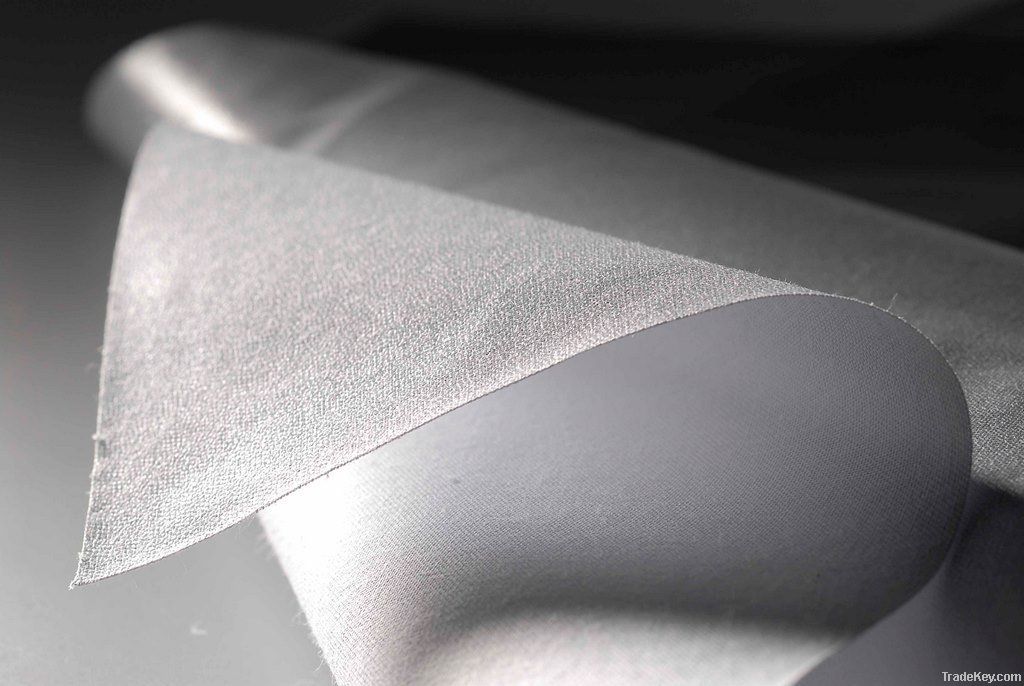FUSIBLE INTERLINING APPLICATIONS AND GENERAL SUGGESTIONS
During the application, the coat on the fusible interlining is
liquidized by using heat, and transfer of this liquid onto the
cloth at necessary amount, is established by the pressure. At
the end of this process, by the cooling and the solidification
of the coat, perfect fusing of the cloth and the fusible
interlining is established.
In the application of fusible interlining adhesion, the safest
way is to use a press machine. The quality and the well-kept
state of the press is one of the most important factors that
directly affect the final quality of the shirt. Although the
type of fusible interlining may differ with regard to the cloth
quality to be applied, there are some general criteria about
the usage of the presses. Press temperature should be around,
**0 degrees Celsius for fusible interlining products that are
**0gr/m2 or below,
**0 degrees Celsius for fusible interlining products that are
between **0gr/m2 and
**0gr/m2
**5 degrees Celsius for fusible interlining products that are
**0gr/m2 or above.
To control the suggested temperature, temperature measuring
papers should be used; those heat sensitive papers should be
placed between the cloth and the fusible interlining while they
are going into the press. Temperature is measured by the
darkening rate of the heat indicators on the paper. If this
process is applied to the right and left wings of the press at
the same time, it allows observing whether heat differences
occur between wings, or not.
PROPERTIES OF PRESS
To keep the quality at standards, the maintenance of the press
should be made regularly and on time.
It should be used in an environment, which is isolated from the
flow of yarn and fibre, and humidity.
It should have the structure and properties that are matching
with the purpose.
The heat and pressure values should be homogenous on the
surface of the press blanket.
The similarity of the parameter indicators ( pressure and heat
) and actual indicators should be checked frequently, in case
of mismatching occasions, the maintenance should be informed
for the necessary fixing.
The parameter indicators should be sensitive enough. Some
analogue indicators might have temperature reading tolerances
between ***5 C. In such cases; the thermometer might close the
circuit at **5 degrees Celsius, whereas it ought to do so at
**0 degrees Celsius, and may mislead the operator.
There should not be any corrosion allowed on the press
cylinders, and the cylindrical pressure should be equally
balanced on left, right and middle parts.
The cylinders should be checked frequently, the silicone
covered cylinders must be changed regularly and the hardness of
the silicone should be controlled continuously.
The operators should be experienced.
For the presses operating with single personnel; as the
blankets may erode unequally, the personnel should work in
rotation.
Products that come out of the press should not be handled
before they are cooled, and in case of necessity for handling
hot, appropriate care should be given. Otherwise, finger marks
and loosen strength occurs at the points of
contact.
There should not be any deep scratches or patches on the
blanket surface. If there are patches, care must be given to
make the fusing of cloth and fusible interlining apart from
this patchy area.
BASIC SUGGESTIONS ABOUT THE PRESSES
Internal temperature of the press must frequently be controlled
through electronic thermometer or temperature measuring papers.
In the mornings, ( especially in winter ) when the presses are
first started, overall temperature in the press may remain
below the optimum level even though thermometer, being fed by
the resistance, indicates the right temperature. In such case,
differences may occur between applications in the early
mornings and afterwards. This is an important aspect that must
be paid attention in terms of the quality of the product. In
order to avoid this problem, no fusing should be done, for at
least *0 minutes after the press is started.
OBSERVING THE INTERNAL PRESSURE AND HEAT HOMOGENITY OF PRESS
Compress the cloth and the fusible interlining, cut in 5 cm
stripes, simultaneously, to be fused at the left, right and
middle parts of the press and check if any differences occur in
their dismantlement strengths. The dismantlement strength
should be minimum 1.2 Kg.
Compress the shirt collar, in parellel to blanket’s flowing
direction. Check the dismantlement strength. If there is
strength difference between the sides, compress once more while
turning the left and right sides upside down. In this case, if
the strength difference disappears, it means that the problem
is in press cylinders, have it checked immediately.
You could also do this control, when the press is cold, by
using white A4 size standard papers and an unused carbon paper.
Place the unused A4 size carbon paper between 2 white A4 size
papers. Compress the papers from the left, right and middle at
the same time. Observe the darkening ratio of the white papers
by the carbon paper and see whether its marks are different at
the left, right and middle parts, or not.

